|
|
|
Sort Order |
|
|
|
Items / Page
|
|
|
|
|
|
|
| Srl | Item |
| 1 |
ID:
133161
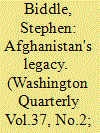

|
|
|
|
|
| Publication |
2014.
|
| Summary/Abstract |
The war in Afghanistan is not over. Nor is it ending any time soon. The U.S. role may end in 2016, in whole or in part, but the war will continue-and its ultimate outcome is very much in doubt. The conflict is now stalemated militarily, and will likely stay that way as long as outsiders pay the large bills needed to keep the Afghan National Security Forces (ANSF) in the field and fighting. The war will thus grind onward until this funding dries up or the two sides negotiate a compromise settlement, neither of which is imminent. Depending on how any talks unfold, historians in 2050 could thus look back on this war as a costly but tolerable outcome for the West, as a wasteful disaster, or as something in between; for now, all we know for sure is that it continues.
|
|
|
|
|
|
|
|
|
|
|
|
|
|
|
|
| 2 |
ID:
068266
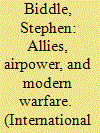

|
|
|
| 3 |
ID:
155236


|
|
|
|
|
| Summary/Abstract |
After fifteen years of war in Afghanistan and Iraq, many now see “small-footprint” security force assistance (SFA)–training, advising, and equipping allied militaries–as an alternative to large U.S. ground-force commitments to stabilize weak states. SFA, however, confronts challenges of interest misalignment between the United States and its typical partners. The resulting agency losses often limit SFA's real ability to improve partners' military effectiveness. For SFA, small footprints usually mean small payoffs.
|
|
|
|
|
|
|
|
|
|
|
|
|
|
|
|
| 4 |
ID:
111742
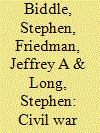

|
|
|
|
|
| Publication |
2012.
|
| Summary/Abstract |
Outside intervention in civil warfare is important for humanitarian, theoretical, and practical policy reasons-since 2006, much of the debate over the war in Iraq has turned on the danger of external intervention if the United States were to withdraw. Yet, the literature on intervention has been compartmented in ways that have made it theoretically incomplete and unsuitable as a guide to policy. We therefore integrate and expand upon the theoretical and empirical work on intervention and apply the results to the policy debate over the US presence in Iraq using a Monte Carlo simulation to build upon the dyadic results of probit analysis. We find that Iraq is, in fact, a significantly intervention-prone conflict in an empirical context; the prospect of a wider, regional war in the event that violence returns in the aftermath of US withdrawal cannot safely be ignored.
|
|
|
|
|
|
|
|
|
|
|
|
|
|
|
|
| 5 |
ID:
096488


|
|
|
| 6 |
ID:
053844
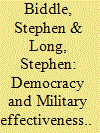

|
|
|
| 7 |
ID:
164483
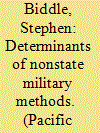

|
|
|
|
|
| Summary/Abstract |
For generations, most analysts treated state and nonstate war making as a dichotomy, with states employing high-intensity ‘conventional’ methods centered on seizing and holding ground, but with nonstate actors using low-intensity ‘irregular’ methods such as roadside bombings, ambushes, and assassinations. This article, by contrast, argues that many nonstate actors have adopted substantially conventional warfighting styles, and that more are likely to do so over time. Increasingly, the best predictor of a combatant’s military methods is not its status as a state as opposed to a nonstate actor, but its internal politics – and especially its institutional maturity and war aims.
|
|
|
|
|
|
|
|
|
|
|
|
|
|
|
|
| 8 |
ID:
123044
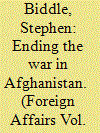

|
|
|
|
|
| Publication |
2013.
|
| Summary/Abstract |
International forces in Afghanistan are preparing to hand over responsibility for security to Afghan soldiers and police by the end of 2014. U.S. President Barack Obama has argued that battlefield successes since 2009 have enabled this transition and that with it, "this long war will come to a responsible end." But the war will not end in 2014. The U.S. role may end, in whole or in part, but the war will continue -- and its ultimate outcome is very much in doubt.
|
|
|
|
|
|
|
|
|
|
|
|
|
|
|
|
| 9 |
ID:
147045
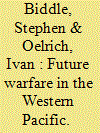

|
|
|
|
|
| Summary/Abstract |
Many analysts worry that improvements in Chinese missile, sensor, guidance, and other technologies will enable China to deny the U.S. military access to parts of the Western Pacific that the United States has long controlled. Although these “antiaccess, area denial” (A2/AD) capabilities are real, they are a geographically limited long-term threat. As both the United States and China deploy A2/AD capabilities, a new era will emerge in which the U.S. military no longer enjoys today's command of the global commons, but is still able to deny China military hegemony in the Western Pacific. In this new era, the United States will possess a sphere of influence around allied landmasses; China will maintain a sphere of influence over its own mainland; and a contested battlespace will cover much of the South and East China Seas wherein neither power enjoys wartime freedom of surface or air movement. This in turn suggests that the Chinese A2/AD threat to U.S. allies is real but more limited than often supposed. With astute U.S. choices, most U.S. allies in this new system will be imperfectly, but substantially, secure.
|
|
|
|
|
|
|
|
|
|
|
|
|
|
|
|
| 10 |
ID:
082886
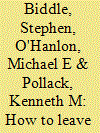

|
|
|
|
|
| Publication |
2008.
|
| Summary/Abstract |
The situation in Iraq is improving. With the right strategy, the United States will eventually be able to draw down troops without sacrificing stability
|
|
|
|
|
|
|
|
|
|
|
|
|
|
|
|
| 11 |
ID:
053430
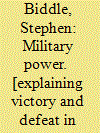

|
|
|
|
|
| Publication |
New Jersey, Princeton University Press, 2004.
|
| Description |
xi, 337p.
|
| Standard Number |
0691116458
|
|
|
|
|
|
|
|
|
|
|
|
Copies: C:1/I:0,R:0,Q:0
Circulation
| Accession# | Call# | Current Location | Status | Policy | Location |
| 048502 | 355.02/BID 048502 | Main | On Shelf | General | |
|
|
|
|
| 12 |
ID:
064561


|
|
|
| 13 |
ID:
068232


|
|
|
| 14 |
ID:
158005
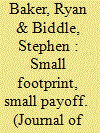

|
|
|
|
|
| Summary/Abstract |
After 15 years of war in Afghanistan and Iraq, many now see ‘small-footprint’ security force assistance (SFA) – training, advising and equipping allied militaries – as an alternative to large US ground-force commitments. Yet, its actual military efficacy has been little studied. This paper seeks to fill this gap. We find important limitations on SFA’s military utility, stemming from agency problems arising from systematic interest misalignment between the US and its typical partners. SFA’s achievable upper bound is modest and attainable only if US policy is intrusive and conditional, which it rarely is. For SFA, small footprints will usually mean small payoffs.
|
|
|
|
|
|
|
|
|
|
|
|
|
|
|
|
| 15 |
ID:
071402


|
|
|
| 16 |
ID:
076549


|
|
|
|
|
| Publication |
2007.
|
| Summary/Abstract |
Many believe that US speed, precision, and situation awareness account for low Coalition casualties and limited damage to Iraqi infrastructure in the 2003 invasion of Iraq. The details of the campaign's actual conduct, however, suggest otherwise. An analysis using evidence collected in a series of 176 interviews with a wide range of campaign participants from both sides of the conflict suggests that Iraqi weaknesses, and not just US strengths, may have been necessary preconditions for the initial campaign's low cost - a finding with very different implications for defense policy than the prevailing view.
|
|
|
|
|
|
|
|
|
|
|
|
|
|
|
|
| 17 |
ID:
113673
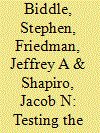

|
|
|
|
|
| Publication |
2012.
|
| Summary/Abstract |
Why did violence decline in Iraq in 2007? Many policymakers and scholars credit the "surge," or the program of U.S. reinforcements and doctrinal changes that began in January 2007. Others cite the voluntary insurgent stand-downs of the Sunni Awakening or say that the violence had simply run its course with the end of a wave of sectarian cleansing; still others credit an interaction between the surge and the Awakening. The difference matters for policy and scholarship, yet this debate has not moved from hypothesis to test. An assessment of the competing claims based on recently declassified data on violence at local levels and information gathered from seventy structured interviews with coalition participants finds little support for the cleansing or Awakening theses. Instead, a synergistic interaction between the surge and the Awakening was required for violence to drop as quickly and widely as it did: both were necessary; neither was sufficient. U.S. policy thus played an important role in reducing the violence in Iraq in 2007, but Iraq provides no evidence that similar methods will produce similar results elsewhere without local equivalents of the Sunni Awakening.
|
|
|
|
|
|
|
|
|
|
|
|
|
|
|
|
|
|
|
|
|